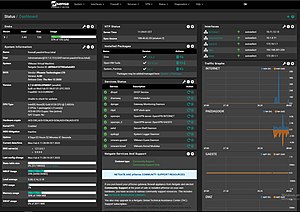PfSense
| Version of the FreeBSD operating system | |
 | |
 The main dashboard of pfSense 2.7.0-DEVELOPMENT
| |
| Developer | Rubicon Communications, LLC (Netgate) |
|---|---|
| OS family | FreeBSD |
| Working state | Current |
| Source model | Closed source and open source |
| Released to manufacturing |
Oct 2006 |
| Latest release |
|
| Repository | |
| Platforms | 32-bit (discontinued in 2.4.x); 64-bit Intel / AMD |
| Default user interface |
Web |
| License | Apache License 2.0 (Applies to pfSense CE) |
| Official website | pfsense |
| Support status | |
| |
pfSense is a firewall/router computer software distribution based on FreeBSD. The open source pfSense Community Edition (CE) and pfSense Plus is installed on a physical computer or a virtual machine to make a dedicated firewall/router for a network. It can be configured and upgraded through a web-based interface, and requires no knowledge of the underlying FreeBSD system to manage.
Overview
The pfSense project began in 2004 as a fork of the m0n0wall project by Chris Buechler and Scott Ullrich. Its first release was in October 2006. The name derives from the fact that the software uses the packet-filtering tool, PF.
Notable functions of pfSense include traffic shaping, VPNs using IPsec or PPTP, captive portal, stateful firewall, network address translation, 802.1q support for VLANs, and dynamic DNS. pfSense can be installed on hardware with an x86-64 processor architecture. It can also be installed on embedded hardware using Compact Flash or SD cards, or as a virtual machine.
WireGuard protocol support
In February 2021, pfSense CE 2.5.0 and pfSense Plus 21.02 added support for a kernel WireGuard implementation. Support for WireGuard was temporarily removed in March 2021 after implementation issues were discovered by WireGuard founder Jason Donenfeld. The July 2021 release of pfSense CE 2.5.2 version re-included WireGuard.